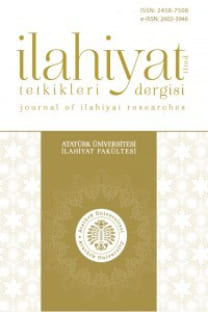Mehmed Zihni Efendi. el-Kavlü’s-Sedîd fî ‘İlmi’t-Tecvîd (Tecvîd-i Cedîd). İstanbul: Dâru’t-Tıbâ‘ati’l-‘Âmire / Publishing, 1328.
Mehmed Zihni Efendi, el-Kavlü’s-Sedîd, Tecvîd-i Cedîd, Kırâât, Mushaf, Tecvid
Mehmed Zihni Efendi. el-Kavlü’s-Sedîd fî ‘İlmi’t-Tecvîd (Tecvîd-i Cedîd). İstanbul: Dâru’t-Tıbâ‘ati’l-‘Âmire / Publishing, 1328.
Mehmed Zihni Efendi, al-Qawlu’s-Sedid, Tajwid-i Jadid, Qiraat, Mushaf, Tajwid,
___
- Bursalı Mehmet Tahir Efendi, Osmanlı Müellifleri. İstanbul: Matba‘a-ı ‘Âmire, 1333.
- İbnü’l-Cezerî, Şemsüddin Muhammed b. Muhammed. Manẓûmetü ṭayyibeti’n-neşr fi’l-ḳırâ’âti’l-‘aşr. Thk. Eymen Rüşdî Süveyd. Dımaşk: Dâru’l-Gavsânî, 1434/2013.
- Kılıç, Hulusi. “Mehmed Zihni Efendi”. Türkiye Diyanet Vakfı İslâm Ansiklopedisi. 28/542-543. Ankara: TDV Yayınları, 2003.
- Zihni Efendi, Mehmed. el-Ḳavlü’s-sedîd fi ‘ilmi’t-tecvîd (Tecvîd-i cedîd). İstanbul: Dâru’t-Tıbâ‘ati’l-‘Âmire, 1328.
- ISSN: 2458-7508
- Yayın Aralığı: 2
- Başlangıç: 1975
- Yayıncı: Atatürk Üniversitesi
XIX. Yüzyılda İdrîsiyye Tarikatının Selefî Tasavvuf’a Evrilen Kimliği ve Islahatçı Yönü
Felsefî Kelam ve Ahlâk Felsefesi Bağlamında Kötülük Problemi: Nasîruddin Tûsî Merkezli Bir Analiz
Eski Arap Şiiri Sorgulanamaz mı?: Câhiliye Şiirinin Kanonlaşmasına Dair Bir Değerlendirme
Yapay Zekâ ile 2020-2025 Yıllarında Cinsiyete Göre Dindarlık Durumunun Tahmini
Muhammed KIZILGEÇİT, Murat ÇİNİCİ, Esra TUYSUZ
Başlangıçtan Bugüne el-Ḥurūfu’l-Muḳaṭṭaʿa Hakkındaki Görüşlerin Kronolojik Bir Değerlendirmesi
Tasavvufta İhsan Teriminin Kavram Ağı Üzerine Analitik Bir Değerlendirme
Güldane GÜNDÜZÖZ, Soner GÜNDÜZÖZ
Dört Kaynak Hipotezi Karşıtı Olarak John Van Seters ve Tevrat Eleştirisi
Hay b. Yakzan ve Robinson Crusoe Adlı Eserlerin Tarihsel Fenomenolojik Açıdan İncelenmesi
